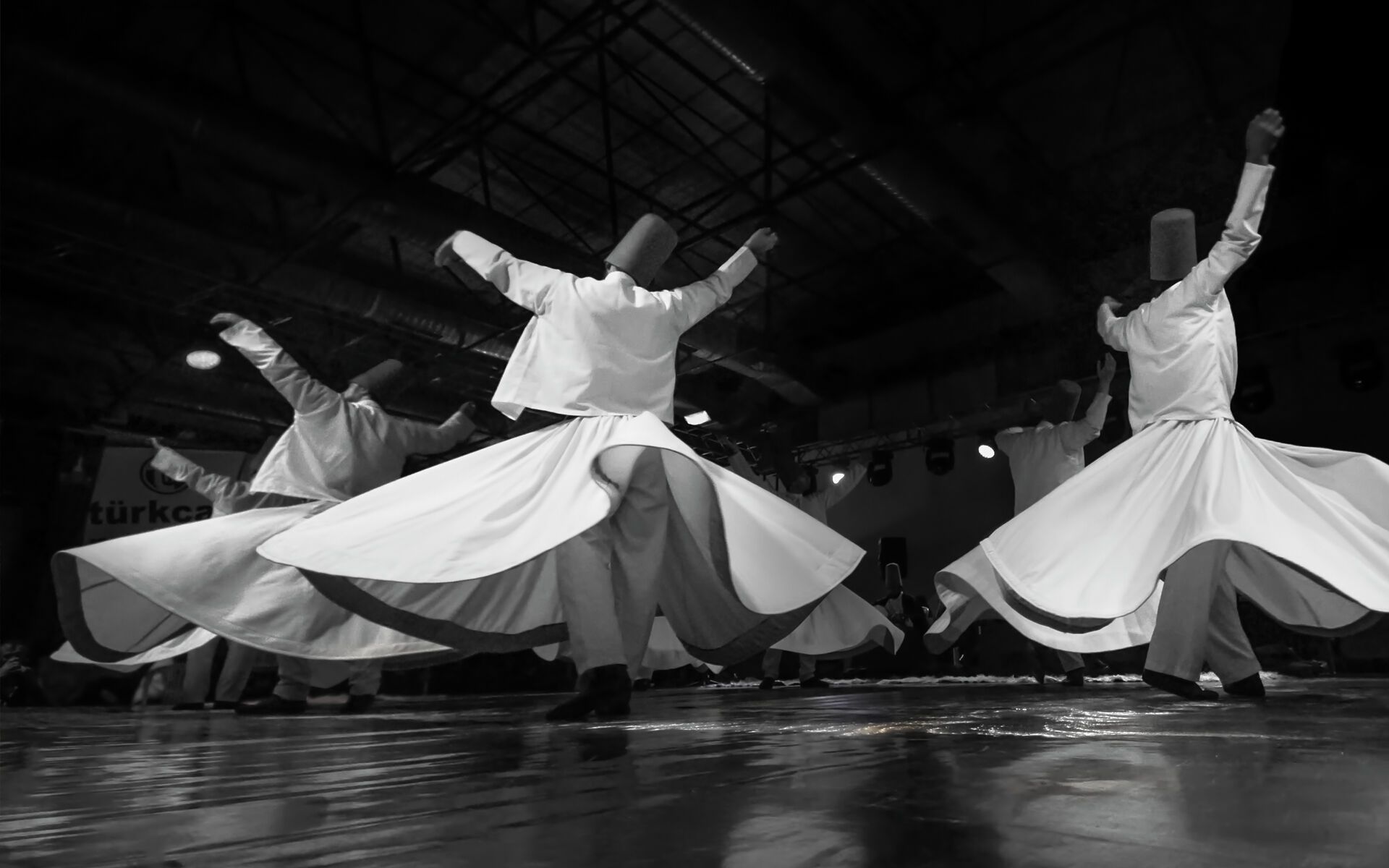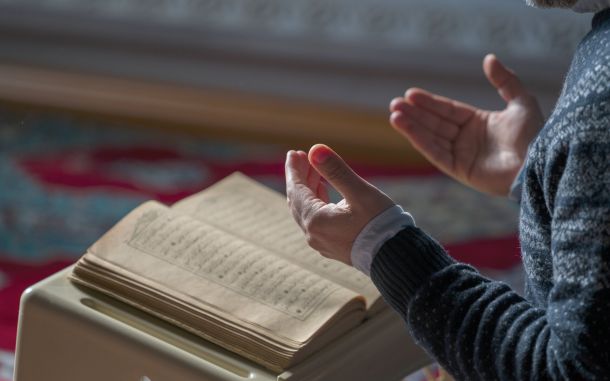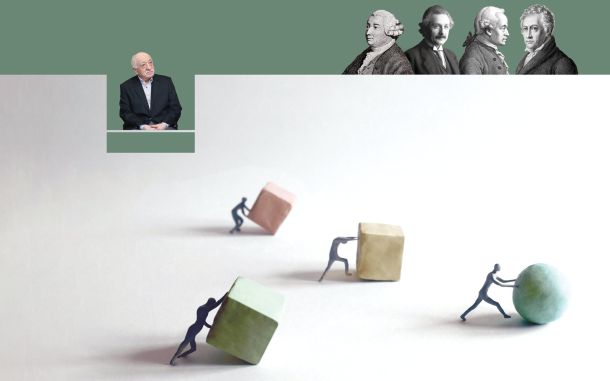The Troubled Watermill - Dertli Dolap: A Commentary

In This Article
-
Emre's poem, The Troubled Watermill, expresses concepts that are fundamental to not only Tasawwuf and ‘Ishq (passionate love) but understanding all of reality and man’s place in it. Still, it does so in a concise and beautiful way.
-
Rather than Rumi’s command of “Listen!” starts the Masnavi, Emre most often opts for a more experiential style, inquiring and learning about whatever destiny decrees will appear to you.
-
Even though the watermill complains and groans of his troubles, even though the reed-flute sings of its separation, and they both wish to return to their previous states—their disparate order— the true gnostic is one who recognizes the necessity of such events.
My intention in writing this piece is to elucidate crucial concepts in a poem written by Yunus Emre—concepts needed to understand the Sufi worldview. A mysterious figure, almost all that we know of Emre comes from the local peoples of Anatolia. He is an exemplar of the “folk people’s poet”.” We have no real works written by him, his divan instead being a collection of inherited poems by Anatolians. His poem, The Troubled Watermill, expresses concepts that are fundamental to not only Tasawwuf and ‘Ishq (passionate love) but understanding all of reality and man’s place in it. Still, it does so in a concise and beautiful way.
For elucidating the concepts of The Troubled Watermill, and my own understanding of Emre’s ideas, my greatest teacher has without a doubt been Mawlana Jalal Al-Din Rumi. Emre and Rumi, in addition to being contemporaries, were similar in many ways. While they were both very learned in the theological and mystical scene of their time, I believe that they both looked at the universe with an eye wholly unique to them. They cannot be strictly categorized as part of either Ahmad Al-Ghazali’s tradition of mystical love or the philosophizing of Ibn ‘Arabi. Instead, it seems to me that their worldview and method of expression is uniquely Qur’anic. Over the course of this commentary, I will frequently mention lines from the beginning of the Masnavi, taken from Jawid Mojaddedi’s translation. I hope for this to be a source of inspiration and learning as well as showing the similarities in experience between the two individuals.
The Commentary
Why do you groan, O Watermill? For I’ve troubles, I groan
I fell in love with the Lord; For It do I groan
We start our journey alongside Yunus Emre, traveling through the hills, villages, and sights of Anatolia. Rather than Rumi’s command of “Listen!” that starts the Masnavi, Emre most often opts for a more experiential style, inquiring and learning about whatever destiny decrees will appear to you.
In one such incident, Emre happens upon a huge watermill; its purpose is to transport water for the town inhabitants’ consumption. When he sees the watermill, Emre is put off by the non-stop, agonizing squeaking and groaning of the huge wheel. And so he asks the seemingly sad creature: Why do you groan, O Watermill?
The watermill aptly responds, declaring that his troubles are the source of the groaning. This declaration of a troubled nature and the need to cry out, we will see, is repeated throughout the entire poem. It is quite fitting as well, as the watermill here is speaking as the lover, representing both every single being and Emre, the inquirer. ‘Ashiq Yunus Emre would not be able to stay silent when he is troubled in such a way, just as the gigantic wooden watermill or the reed-flute cannot, as expressed by Mawlana Rumi in:
My Song’s expressed each human’s agony.
Then, the watermill goes on, citing falling in love with the Lord as the reason for his groans. The original Turkish has a subtle ambiguity that adds many more layers to the meaning. The personal pronouns in Turkish are gender neutral, and so the ‘Onun’(It) used here could refer to both “fell in love with the Lord” or “For The Lord.”
The watermill declares that because he loves, he groans, and as far as the former will continue, the latter will as well. The watermill is in actuality a poet, wailing and moaning about the calamity that love has caused him. It does not let him rest, have peace or tranquility. The watermill groans, and he does it “For The Lord,” as this is his duty. The watermill, in his continuous groaning, is fully aware that he is responding to Allah’s command: “O believers! Always remember Allah often, and glorify Him morning and evening.”(33:41-42).
They found me on a mountain; My arms and wings they plucked
Saw me fit for a watermill; For I’ve troubles, I groan
The watermill continues to express his woes, and here we get a clearer picture as to why he is troubled. It seems peculiar that a lover of Allah in constant remembrance of Him should not be included in “Surely in the remembrance of Allah do hearts find comfort”(13:28).
Yet, the watermill is still troubled, and his reasoning is They found me on a mountain; My arms and wings they plucked. The watermill was not always a watermill. Long ago, he was a majestic tree upon the mountain, his arms and wings stretching up towards the sky. He was grand and strong, as much a peg stabilizing the earth as the mountain itself.
But the woodcutters came. They saw him fit for a watermill and cut him down and dissected him. Now the tree is no longer a tree, his home no longer the mountain. He is instead a groaning watermill—groaning because he is a watermill.
This story is not unique to the watermill; it is the story of all mankind and creation. We were once One with our Lord, and then we were rent asunder. We used to exist purely and without multiplicity in Him. Without disease or defect, evil or hate, we were like Adam enjoying the fruits of paradise in bliss.
And then, The Lord decided that “I desire to be known,” and so he created. We heard the command of “Be!” and buckled under its strength, wounded into existence. That creation, the separation from our Lord, is the severing of the tree from its roots in the mountain.
Then, while we were still astonished and impaired from the flash of creation, the divine speech came once more, this time inquiring: “Am I not your Lord?”(7:172). In being exposed to His absolute Beauty and Majesty, we fell onto our knees, hearts hopelessly in love without any hope of release. So, we cried out, and continue to do so in our groans, “Yes indeed, we bear witness!”(7:172). It was then that our arms and wings were plucked, no longer free to our own devices but slavesto love forevermore.
And after that most sacred covenant, we were sent down to Earth. As Emre said in his last words to Rumi, we were wrapped in meat and bone and took on our names. How strange it is, that souls existing in pre-eternity with Him are now here, temporal and blotched. How strange it is that the blessed and pure Adam walked upon the earth and built houses with mud; how strange that a grand tree on a mountain was seen fit to become a groaning watermill.
From the mountain they cut my wood; My disparate order they ruined
But an unwearied poet I am; For I’ve troubles, I groan
I think that for whoever is familiar with the opening lines of the Masnavi, the relationship between it and this poem is clearly evident. The watermill is for Yunus Emre what the reed-flute was for Mawlana Rumi. The reed-flute cries out in agony, the haunting notes it plays giving an account of what it is, where it comes from, and who it wants to unite with:
My song’s expressed each human’s agony,
A breast which separation’s split in two
Is what I seek, to share this pain with you:
When kept from their true origin, all yearn
For union on the day they can return.
Just as the reed-flute complains of separation from his source, so does the watermill. Is it not inane, that a grand and majestic tree of the mountains has found itself a creaky, spinning watermill? The tree once was whole with his beloved, his roots burrowed deep into the ground, inseparable from the soil.
But both him and the reed-flute were split in two—not by meticulously dissecting the roots of the tree or reed-bed, or by burning it so the whole dies together, but rather with an axe that swiftly cut through the middle. Swift and merciless the axe of “Be!” came from pre-eternity and cut us off from our source. And as Rumi explains, all things yearn for union with their true source.
What the watermill refers to in My disparate order they ruined are the wondrous blisses of union. The beginning of every path, when the traveler is without maturity or realization, is always remembered to be the sweetest, even if one recognizes its deficiencies. Men think of their childhood and wish for such nostalgic innocence and ease; students think of their first years in school and wish for such comfort; and Adam thinks of the fruits of paradise and wishes to find them once more.
However, even though the watermill complains and groans of his troubles, even though the reed-flute sings of its separation, and they both wish to return to their previous states—their disparate order— the true gnostic is one who recognizes the necessity of such events.
The creation of all was according to a design; and so the fall of Adam from paradise was as well. The entire universe is but a theater for the Divine Names, and it would not befit the playmaker to not hire actors. The proper actors, in turn, must not abandon the play, where they are paid for their service, as well as to act out divine scenes far above their station.
So, the Watermill declares himself to be: But an unwearied poet I am. That is all he is: his groans and moans are poetry. He does not tire or stop his poetry—firstly because, even though he has found himself to be a watermill whilst before he was a mature tree, his duty of remembrance and worship is not abrogated by his current state.
Secondly, the true lover is one that never stops crying for his Beloved. The fire sparked from separation is one that burns hotter and hotter as separation continues, and how can a lover on fire ever stop complaining about burning? Mawlana Rumi himself expresses this beautifully:
While ordinary men on drops can thrive
A fish needs oceans daily to survive:
The way the ripe must feel the raw can’t tell…
The poetry of the watermill is his worship, caused by the trouble of separation. The groans and squeaks you hear are in fact everything that the watermill says; he has no other words. For the true lover, nothing falls from his tongue except his troubles. ‘Ishq enraptures the entire being, leaving no room for wits, comfort, or folly. When you blow into the reed-flute, all you hear are its cries. When you listen to a watermill, all you hear are its groans. And so, if you look for the true lovers of Allah, all you must hear are His Glorifications.
(To be continued in the next issue.)
The Troubled Watermill
By Yunus Emre
Why do you groan, O Watermill; For I’ve troubles, I groan
I fell in love with the Lord; For It do I groan
They found me on a mountain; My arms and wings they plucked
Saw me fit for a watermill; For I’ve troubles, I groan
From the mountain they cut my wood; My disparate order they ruined
But an unwearied poet I am; For I’ve troubles, I groan
I am The Troubled Watermill; My water flows, roaring and rumbling
Thus has Allah commanded; For I’ve troubles, I groan
I am but a mountain’s tree; Neither am I bitter, nor sweet
I am but a pleader to the Lord; For I’ve troubles, I groan
Yunus, whoever comes here will find no joy; Will not reach his desire
Nobody stays in this Transient; For I’ve troubles, I groan
Turkish:
Dolap niçin inilersin; Derdim vardır inilerim,
Ben Mevla'ya aşık oldum; Onun için inilerim,
Beni bir dağda buldular; Kolum kanadım yoldular,
Dolaba layık gördüler; Derdim vardır inilerim,
Dağdan kestiler hezenim; Bozuldu türlü düzenim,
Ben usanmaz bir ozanım; Derdim vardır inilerim,
Benim adım dertli dolap; Suyum akar yalap yalap,
Böyle emreylemiş Çalap; Derdim vardır inilerim,
Ben bir dağın ağacıyım; Ne tatlıyım ne acıyım,
Ben Mevlaya duacıyım; Derdim vardır inilerim,
Yunus bunda gelen gülmez; Kişi muradına ermez,
Bu fanide kimse kalmaz; Derdim vardır inilerim








